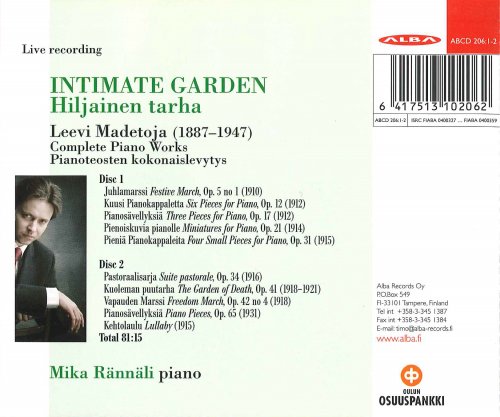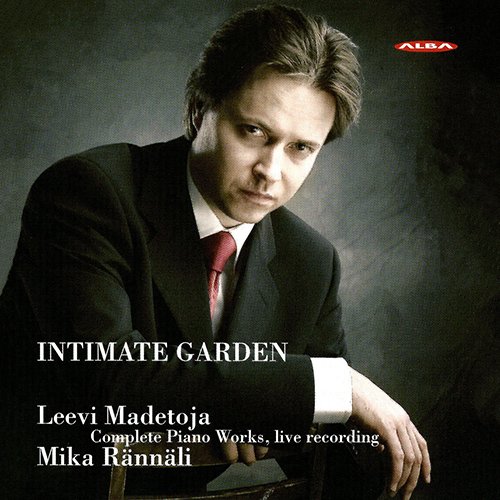
Mika Rännäli - Madetoja: Complete Piano Works (2000)
BAND/ARTIST: Mika Rännäli
- Title: Madetoja: Complete Piano Works
- Year Of Release: 2000
- Label: Alba
- Genre: Classical Piano
- Quality: flac lossless (tracks) +Booklet
- Total Time: 01:21:10
- Total Size: 271 mb
- WebSite: Album Preview
Tracklist
CD1
01. Shakkipeli (Chess), Op. 5: No. 1, Juhlamarssi [Festive March]
02. 6 Pianokappaletta (6 Pieces for Piano), Op. 12: I. Valssi [Waltz]
03. 6 Pianokappaletta (6 Pieces for Piano), Op. 12: II. Kansanlaulu [Folk Song]
04. 6 Pianokappaletta (6 Pieces for Piano), Op. 12: III. Scherzino
05. 6 Pianokappaletta (6 Pieces for Piano), Op. 12: IV. Menuetto vanhaan tyyliin [Minuet]
06. 6 Pianokappaletta (6 Pieces for Piano), Op. 12: V. Kehtolaulu [Cradle Song]
07. 6 Pianokappaletta (6 Pieces for Piano), Op. 12: VI. Romanssi [Romance]
08. Pianosavellyksia (Piano Pieces), Op. 17: I. Du var mig mera nara [You were closest to me]
09. Pianosavellyksia (Piano Pieces), Op. 17: II. Pieni romanssi [A Little Romance]
10. Pianosavellyksia (Piano Pieces), Op. 17: III. Tanssi [Dance]
11. Pienoiskuvia, Op. 21: I. Iltatahti (The Evening Star)
12. Pienoiskuvia, Op. 21: II. Valsette
13. Pienoiskuvia, Op. 21: III. Nocturne
14. Pienoiskuvia, Op. 21: IV. Leikki (The Game)
15. Pienoiskuvia, Op. 21: V. Lasten marssi (Children's March)
16. Pienia kappaleita pianolle (4 Small Piano Pieces), Op. 31: I. Paimenen unelma [The Shepherd's Dream]
17. Pienia kappaleita pianolle (4 Small Piano Pieces), Op. 31: II. Prelude
18. Pienia kappaleita pianolle (4 Small Piano Pieces), Op. 31: III. Pieni satu [A Little Tale]
19. Pienia kappaleita pianolle (4 Small Piano Pieces), Op. 31: IV. Vanha muisto [A Reminiscence]
CD2
01. Pastoraalisarja (Suite pastorale), Op. 34: I. Aamu [Morning]
02. Pastoraalisarja (Suite pastorale), Op. 34: II. Caprice
03. Pastoraalisarja (Suite pastorale), Op. 34: III. Legenda [Legend]
04. Pastoraalisarja (Suite pastorale), Op. 34: IV. Valssi [Waltz]
05. Kuoleman puutarha (The Garden of Death), Op. 41: I. Andante andantino
06. Kuoleman puutarha (The Garden of Death), Op. 41: II. Poco lento. con moto
07. Kuoleman puutarha (The Garden of Death), Op. 41: III. Berceuse
08. Vapauden Marssi (Freedom March), Op. 42, No. 4 [arr. for piano]
09. Pianosavellyksia (Piano Pieces), Op. 65: I. Andantino
10. Pianosavellyksia (Piano Pieces), Op. 65: II. Tempo di menuetto
11. Pianosavellyksia (Piano Pieces), Op. 65: III. Canzonetta
12. Pianosavellyksia (Piano Pieces), Op. 65: IV. Gavotte
13. Pianosavellyksia (Piano Pieces), Op. 65: V. Allegro scherzando
14. 6 Pianokappaletta, Op. 12: Kehtolaulu [Lullaby]

Hats off, y'all, two CDs' worth of completely forgotten masterpieces! The piano music of Leevi Madetoja (1887-1947) is little known even in his home country of Finland. It consists of six sets of short genre pieces, a more substantial three-movement work called The Garden of Death, and a few little nationalist marches and one lullaby. Madetoja's keyboard style has apparently been called Impressionist, but it shares little with Debussy except for a general dreamy quality; there are no exotic scales, no massed sounds, no terribly unusual textures. The music has been called nationalist, but it seems almost untouched, beyond a general application of iron structural logic to a post-Romantic language, by the style of Sibelius. It's hard, in fact, to liken them to any music of their own time, although the waltz passage in the middle movement of The Garden of Death, a waltz grimly filtered through the experience of war, somewhat resembles Ravel's La valse in its mood. The closest parallel would be to the last set of Beethoven Bagatelles, Op. 126, where every little gesture or turn of melody, no matter how innocent, has its structural significance. Madetoja's short pieces are between 45 seconds and just over four minutes long. They are tonal, albeit very carefully controlled as to the weights of various intervallic combinations, and they are deceptively simple in the same way as Beethoven's pieces -- their complexities unfold in the way rhythms are subtly transformed over the course of a piece. The Garden of Death, written after Madetoja's brother was killed in World War I, is a concise, profound expression of grief.
Pianist Mika Rännäli is an ideal interpreter of these works, exquisitely sensitive to the structural role often played by register. The recording was made live in Oulu, Finland, but aside from the tense immediacy and excitement of the performance you'd never know it. How these wonderful little pieces were forgotten is easy to see; they did not conform to atonal orthodoxy. How they got rediscovered we do not learn from the rather sketchy notes -- they simply provide a brief rundown of the music, with little attempt even to relate it to the rest of Madetoja's output (his symphonies and songs are slightly better known). Perhaps it takes a country where the national legislature attends the opera en masse on the first day of its session to rediscover the hidden musical gems in its midst. However it happened, make it your business to make sure Madetoja's piano music is forgotten no more.
CD1
01. Shakkipeli (Chess), Op. 5: No. 1, Juhlamarssi [Festive March]
02. 6 Pianokappaletta (6 Pieces for Piano), Op. 12: I. Valssi [Waltz]
03. 6 Pianokappaletta (6 Pieces for Piano), Op. 12: II. Kansanlaulu [Folk Song]
04. 6 Pianokappaletta (6 Pieces for Piano), Op. 12: III. Scherzino
05. 6 Pianokappaletta (6 Pieces for Piano), Op. 12: IV. Menuetto vanhaan tyyliin [Minuet]
06. 6 Pianokappaletta (6 Pieces for Piano), Op. 12: V. Kehtolaulu [Cradle Song]
07. 6 Pianokappaletta (6 Pieces for Piano), Op. 12: VI. Romanssi [Romance]
08. Pianosavellyksia (Piano Pieces), Op. 17: I. Du var mig mera nara [You were closest to me]
09. Pianosavellyksia (Piano Pieces), Op. 17: II. Pieni romanssi [A Little Romance]
10. Pianosavellyksia (Piano Pieces), Op. 17: III. Tanssi [Dance]
11. Pienoiskuvia, Op. 21: I. Iltatahti (The Evening Star)
12. Pienoiskuvia, Op. 21: II. Valsette
13. Pienoiskuvia, Op. 21: III. Nocturne
14. Pienoiskuvia, Op. 21: IV. Leikki (The Game)
15. Pienoiskuvia, Op. 21: V. Lasten marssi (Children's March)
16. Pienia kappaleita pianolle (4 Small Piano Pieces), Op. 31: I. Paimenen unelma [The Shepherd's Dream]
17. Pienia kappaleita pianolle (4 Small Piano Pieces), Op. 31: II. Prelude
18. Pienia kappaleita pianolle (4 Small Piano Pieces), Op. 31: III. Pieni satu [A Little Tale]
19. Pienia kappaleita pianolle (4 Small Piano Pieces), Op. 31: IV. Vanha muisto [A Reminiscence]
CD2
01. Pastoraalisarja (Suite pastorale), Op. 34: I. Aamu [Morning]
02. Pastoraalisarja (Suite pastorale), Op. 34: II. Caprice
03. Pastoraalisarja (Suite pastorale), Op. 34: III. Legenda [Legend]
04. Pastoraalisarja (Suite pastorale), Op. 34: IV. Valssi [Waltz]
05. Kuoleman puutarha (The Garden of Death), Op. 41: I. Andante andantino
06. Kuoleman puutarha (The Garden of Death), Op. 41: II. Poco lento. con moto
07. Kuoleman puutarha (The Garden of Death), Op. 41: III. Berceuse
08. Vapauden Marssi (Freedom March), Op. 42, No. 4 [arr. for piano]
09. Pianosavellyksia (Piano Pieces), Op. 65: I. Andantino
10. Pianosavellyksia (Piano Pieces), Op. 65: II. Tempo di menuetto
11. Pianosavellyksia (Piano Pieces), Op. 65: III. Canzonetta
12. Pianosavellyksia (Piano Pieces), Op. 65: IV. Gavotte
13. Pianosavellyksia (Piano Pieces), Op. 65: V. Allegro scherzando
14. 6 Pianokappaletta, Op. 12: Kehtolaulu [Lullaby]

Hats off, y'all, two CDs' worth of completely forgotten masterpieces! The piano music of Leevi Madetoja (1887-1947) is little known even in his home country of Finland. It consists of six sets of short genre pieces, a more substantial three-movement work called The Garden of Death, and a few little nationalist marches and one lullaby. Madetoja's keyboard style has apparently been called Impressionist, but it shares little with Debussy except for a general dreamy quality; there are no exotic scales, no massed sounds, no terribly unusual textures. The music has been called nationalist, but it seems almost untouched, beyond a general application of iron structural logic to a post-Romantic language, by the style of Sibelius. It's hard, in fact, to liken them to any music of their own time, although the waltz passage in the middle movement of The Garden of Death, a waltz grimly filtered through the experience of war, somewhat resembles Ravel's La valse in its mood. The closest parallel would be to the last set of Beethoven Bagatelles, Op. 126, where every little gesture or turn of melody, no matter how innocent, has its structural significance. Madetoja's short pieces are between 45 seconds and just over four minutes long. They are tonal, albeit very carefully controlled as to the weights of various intervallic combinations, and they are deceptively simple in the same way as Beethoven's pieces -- their complexities unfold in the way rhythms are subtly transformed over the course of a piece. The Garden of Death, written after Madetoja's brother was killed in World War I, is a concise, profound expression of grief.
Pianist Mika Rännäli is an ideal interpreter of these works, exquisitely sensitive to the structural role often played by register. The recording was made live in Oulu, Finland, but aside from the tense immediacy and excitement of the performance you'd never know it. How these wonderful little pieces were forgotten is easy to see; they did not conform to atonal orthodoxy. How they got rediscovered we do not learn from the rather sketchy notes -- they simply provide a brief rundown of the music, with little attempt even to relate it to the rest of Madetoja's output (his symphonies and songs are slightly better known). Perhaps it takes a country where the national legislature attends the opera en masse on the first day of its session to rediscover the hidden musical gems in its midst. However it happened, make it your business to make sure Madetoja's piano music is forgotten no more.
As a ISRA.CLOUD's PREMIUM member you will have the following benefits:
- Unlimited high speed downloads
- Download directly without waiting time
- Unlimited parallel downloads
- Support for download accelerators
- No advertising
- Resume broken downloads


